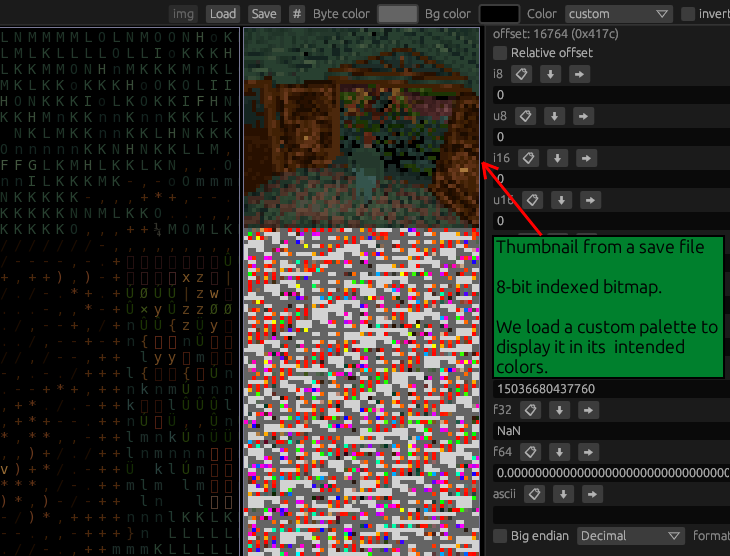Legend:
- = Planned
- = Implemented
Features
- Colorized values
- Easy data alignment
- Built-in process memory editing
- Multiple source types (file/streamed sources)
- Rich command line options
- Bookmarks
- Multiple configurable views
- Lua scripting support for various operations, like fill.
- External command support
- Diffing functionality
- Huge file support through memory mapped files
Non-features
Features
Colorized values
Colorizing values helps a lot with human pattern recognition.

Custom color palettes
Custom color palettes can be saved and loaded, and generated through various means.

Easy data alignment
Hexerator considers it important to easily align data with shortcut keys. Proper alignment can make a lot of difference with pattern recognition.
Process Memory editing
Built-in support for opening memory of a process and viewing/editing it. Can be used to cheat in games, or discover how different applications store data in memory.
You need to run hexerator with root/admin privileges to open memory of other processes.
Multiple source types
Hexerator supports opening both files and streamed sources like standard input or character devices like /dev/urandom.
Bookmarks
Quickly and easily save and access points of interest in the data.
Additional support for setting a type for a bookmark to display and manipulate the data
associated with it.

Multiple configurable views
You can have different views into different regions of the same file, with different column counts and other configurable properties.
Lua scripting support
You can write Lua scripts to:
- Fill a selection
- Generate a custom color palette
- More coming in the future
External command support
Support for executing a custom external command on selected data.
Diffing
There is basic support for showing differences between
- The current buffer and its source file
- The current buffer and an arbitrary file
- The current metadata and the clean metadata
- Support for more coming in the future
For now diffing is pretty barebones, shown as a list of offsets. It will be better fleshed out in the future
Huge file support through memory mapped files
Huge files that couldn't fit in memory can be opened as memory mapped files through a command line option. To be implemented.
Non-features
Insertion
Insertion would complicate implementation, and for most binary data, including process memory, it will just mess up the data.
Memory holes support, generic support for huge data
Originally, I wanted to have a generic mechanism for loading only parts of files, but I found that it would make the implementation way more complex, and possibly inefficient, so I dropped the idea. Huge files will be eventually supported through memory mapped file support.